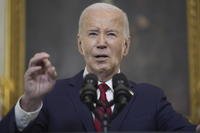New Defense Secretary Ashton Carter pleaded with Congress Tuesday to back President Obama's proposed fiscal 2016 defense budget that exceeds spending caps by about $38 billion.
"I not only welcome your wisdom and experience, I also want your partnership and need your help," in ending automatic budget cuts known as sequestration, Carter said in his first testimony to Congress on the budget since replacing Chuck Hagel in the Pentagon's top job.
Joint Chiefs Chairman Army Gen. Martin Dempsey, who joined Carter before the Senate Armed Services Committee, said that failing to end sequestration would leave the nation's defenses "at the lower ragged edge of manageable risk." He said the budget caps leave "no slack, no margin for error or strategic surprise."
"Our national defense strategy will simply no longer be viable," Dempsey said. "Conflict will take longer to resolve."
Carter echoed previous arguments made by Hagel that the across-the-board spending cuts under the Budget Control Act of 2011 would slice nearly $1 trillion from the defense budget through 2020 -- even as worldwide threats proliferate.
"We have had to endure deep cuts to readiness, weather pay freezes and civilian furloughs, and cut badly needed investments in modernization and critical technologies," Carter said. "At the same time, Congress has sometimes sought to protect programs that DoD has argued are no longer needed, or require significant reform."
As a result, "We have had the worst of both worlds -- a double whammy of mindless sequestration coupled with inability to reform," Carter said. "Sequester is purely the fallout of political gridlock."
There was emerging bipartisan support in the Senate and House on the need to end sequestration for defense, but little in the way of agreement thus far on how to fund the resulting boosts in the Pentagon's budget.
The bipartisan agreement on the threat to national security from continuing the sequester process was reflected in the opening statements of Sens. John McCain, R-Arizona, the SASC chairman, and Jack Reed, D-Rhode Island, the ranking Democrat on the panel.
McCain noted that Obama's $534 billion request for the defense base budget next year was $38 billion above the sequester caps and "in light of recent events, I think this approach was more than justified."
Reed said that the caps undermine troop readiness and "create an urgent and growing strategic problem we simply must address."
On other issues, both Carter and Dempsey said they were concerned about a recent background briefing given by a U.S. Central Command officer in which details of a possible offensive to retake Mosul from militants affiliated with the Islamic State in Iraq and Syria, or ISIS, were disclosed, including an April timeframe and the number of Iraqi brigades that would be involved.
"Clearly, that was an instance of speculation that certainly doesn't reflect what we need to be thinking," Carter said. "Every once in a while, somebody gets out in front of their skis."
Dempsey said that the head of Central Command, Gen. Lloyd Austin, was conducting an internal inquiry on the background briefing to Pentagon reporters and "will take appropriate action."
Carter and Dempsey also said that they were aware of Iranian backing for the current assault by Iraqi National Forces in an effort to take the town of Tikrit from ISIS.
The decision to involve Shiite militia loyal to Iran was taken by the Baghdad government, Carter said. "The Iraqi government in this case did not ask for our support" in the operation, he said.
Dempsey said that the Iranian involvement would only be a concern if it led to Sunni-Shiite sectarianism in the region. If the assault on Tikrit is successful, "it will in the main have been a positive thing," he said.
-- Richard Sisk can be reached at richard.sisk@military.com








